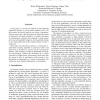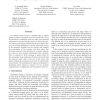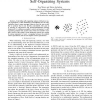121
click to vote
SASO
2009
IEEE
15 years 9 months ago
2009
IEEE
In this paper, we present an analysis of self-organizing bandwidth sharing in priority-based medium access. For this purpose, the priority-based Access Game is introduced. Analysi...
107
Voted
SASO
2009
IEEE
15 years 9 months ago
2009
IEEE
—We consider here multi-agent patrolling as the task for a group of agents to repeatedly visit all the cells of a discrete environment. Wagner et al. [1] have introduced patrolli...
134
click to vote
SASO
2009
IEEE
15 years 9 months ago
2009
IEEE
—The complexity of distributed computing systems and their increasing interaction with the physical world impose challenging requirements in terms of adaptation, robustness, and ...
124
click to vote
SASO
2009
IEEE
15 years 9 months ago
2009
IEEE
An optimal sensor layout is attained when a limited number of sensors are placed in an area such that the cost of the placement is minimised while the value of the obtained inform...
128
Voted
SASO
2009
IEEE
15 years 9 months ago
2009
IEEE
This paper introduces MOCAS (Model Of Components for Adaptive Systems), a generic state-based component model which enables the self-adaptation of software components together wit...
101
Voted
SASO
2009
IEEE
15 years 9 months ago
2009
IEEE
Abstract—Controlling self-organizing systems with given control parameters is often unintuitive and inefficient for the user. Typically, there is some emergent behavior that the...
115
click to vote
SASO
2009
IEEE
15 years 9 months ago
2009
IEEE
Swarming agents often operate in benign geographic topologies that let them explore alternative trajectories with minor variations that the agent dynamics then amplify for improve...
111
Voted
SASO
2009
IEEE
15 years 9 months ago
2009
IEEE
—In sufficiently large heterogeneous overlays message loss and delays are likely to occur. This has a significant impact on overlay routing, especially on longer paths. The exi...
93
Voted
SASO
2009
IEEE
15 years 9 months ago
2009
IEEE
—We examine the use of teleological metareasoning for self-adaptation in game-playing software agents. The goal of our work is to develop an interactive environment in which the ...
105
Voted
SASO
2009
IEEE
15 years 9 months ago
2009
IEEE
—Controlling particle swarm optimization is typically an unintuitive task, involving a process of adjusting low-level parameters of the system that often do not have obvious corr...



